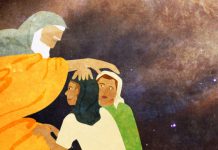A Spy Mission Turns Sour
“What a beautiful mansion!” thought Berel as he admired the homes in this ritzy Paris suburb. “I wonder who lives here?” Assuming that everyone was conversant in Yiddish (the only language that Berel spoke, which even the non-Jews in his shtetl in Poland understood), Berel approached the nearest Parisian and asked, “Who is the occupant of this mansion?”
The poor Frenchman who couldn’t understand a word, asked politely “Qu’avez-vous dit?” (What did you say?)
Berel was certain he had an answer to his query. “Oh the occupant’s name is Kavevudi. He must be quite wealthy to live in such a mansion.”
Throughout his tour of Paris, Berel noticed fields, factories, and warehouses, and whenever he inquired about the owner, the reply was always the same – Kavevudi! Wow, thought Berel, this Kavevudi must own half of Paris!
Finally he passed a funeral, and judging by the size of the procession, he reasoned that a very important person must have passed away. As he inquired about the identity of the deceased, the response was predictably, “Kavevudi”! Berel lifted his hands toward the hearse and called out in his heavy Yiddish accent, “Kavevudi, Kavevudi! What good is all your wealth? Of what value are all of your mansions, fields, factories, and warehouses when in the end you die just like any pauper?!”
In this week’s Parsha, the spies also witnessed many funerals. The Sages say that in every city that they visited, there were funerals of important officials. Instead of rejoicing that God had distracted the Canaanites so that they would not notice the Jewish spies, the Jews too read the signs pessimistically as: “A land that devours its inhabitants” (Numbers 13: 32).
SIN OF THE SPIES
The Parsha begins with God telling Moses to send spies, seemingly a direct commandment. However, the Torah, not being a storybook, is not necessarily in chronological order. In Deut. 1:22 we read that the people demanded that spies be sent, and Moses concurred. Also in the book of Joshua (Ch. 2), Joshua sends two anonymous spies to Jericho [who bring their reply to Joshua alone.]
Question: Did God command that the spies be sent, as implied here, or was it the people’s idea?
Second Question: Why did Moses send 12 famous men, who reported to the entire nation — and not just two unnamed men like Joshua?
SCOUTS AND SPIES
Our Parsha uses the word “to scout” (latur) which refers to the land rather then the term “spy.” The commentator Malbim explains the difference. If a nation is considering the invasion of another, the first thing it must consider is the positive elements of the land they desire. Does it meet their needs and desires? This is particularly important when the nation consists of various tribes, each with its own special interests. So it would be logical to send representatives of every tribe to scout the land and report on its bounty to the entire camp.
However, once a nation decides to conquer, they must send spies to see the weak points of the defense. This is purely for military reasons and they report only to the commander-in-chief.
So we see that since Moses sent scouts to inspect the good of the land and determine the adequacy of the resources, he had to send representatives from every tribe to report their findings to the people. Joshua, on the other hand, sent spies who were military men for purposes of battle strategy, and they reported only to their leader.
NATURAL CAUSE AND EFFECT
The Jews wandering 40 years in the desert lived a supernatural existence. They ate manna, had a portable water supply, and their shoes and clothes didn’t wear out. This, however was not the goal. God created nature, and as a rule wants us to live naturally. The desert years were a “crash course” in trusting, loving, and fearing God! However, once we entered the land, we were required to plant and harvest like everyone else.
In Egypt, God fought all our battles. Now Moses told them to take out their swords and spears to do battle. “Go up to inherit the Promised Land. Do not fear or tremble!” (Deut. 1:21). This implies there was something to be afraid of. The people reacted by saying, “If we must fight a natural battle, we must use military tactics and send scouts and spies.” Moses could not refuse them without being suspected of having something to hide. (Or … “Of course you can test-drive my Cadillac on a dirt road!“)
At this point God appeared to Moses and informed him that if he desires to send spies (on his responsibility), the tribal leaders are the candidates with the best chance of succeeding. It was the people’s decision, with the passive agreement of Moses. God, however, chose the spies, who were all very great to begin with.
DILEMMA OF LIFE
The cause of the spies’ mistake was that once nature starts playing a role, we tend to forget that God made it happen.
In life, we constantly face this dilemma. On the one hand, we must take the necessary natural steps to obtain our needs. We take medicine, look for a spouse and a job, and have an army and air force to protect the nation. Yet we believe that everything is ultimately in the hands of the Creator no matter how much effort we exert.
The bridge between this paradox is prayer. We take the medicine and pray, look for a job and pray, defend our country and pray. Without the help of God, nothing can succeed.
TEST OF THE SPIES
Originally, the spies had good intentions, but ulterior motives crept in. They had leadership positions and were afraid that after entering the Land of Israel, they might lose their positions. Sometimes ulterior motives can lead people to rationalize to an extent that they even fool themselves.
When the spies reached the city of Hebron they got their first glimpse of giants. “We were like grasshoppers in our eyes and so we were in their eyes!” (Numbers 13:33)
Question: How can anyone who has witnessed the Ten Plagues, the splitting of the Red Sea, and the revelation at Sinai, be so impressed by a mere mortal giant?
Answer: The spies knew they were living on a higher spiritual elevation than the Canaanites. However, they reasoned that if for them, a giant physical stature was a necessary requirement to survive in the land, certainly on an elevated level one must be a “spiritual giant” to live in the land (heard from the Klausenberger Rebbe).
CALEV AND JOSHUA
One of the spies was Joshua. As the disciple of Moses, he got a special blessing from his mentor, who was aware of the tremendous test facing them. On the other hand, Calev, from the tribe of Judah, felt himself weakening and would soon be frightened into following the plan of the other spies to give a bad report. Since they were near the city of Hebron, the burial grounds of the Patriarchs and Matriarchs, Calev went alone to pray at their graves so that he might withstand the test. This is the meaning of the change in person, “They (plural) went up to the Negev and he (singular) came to Hebron” (Numbers 13:22).
At this point the spies decided to give a negative report and scare the people. This went against the essence of their mission. Their mission statement was: “See the land and its inhabitants, are they strong, are they weak, are they few or are they many” (Numbers 13:18). But Moses did not imply that this would make a difference if we attack or not. Moses’ intention was that it makes no difference if they are strong or not, we will conquer them in any case.
The purpose of the spies’ mission was to have an eyewitness report of the land prior to the entry of the Israelites, so that all future posterity would know what a miracle God had done to enable them to conquer such powerful nations of giants.
FRUITS OF THE LAND
Moses specifically told the spies to bring back some fruit of Israel. Since it was the time of the grape harvest, they would not arouse suspicion by carrying clusters of grapes. The fruit was so gigantic that it took eight men to carry one cluster of grapes (on two poles), and one man each for the pomegranate and fig (probably each the size of a watermelon). (Numbers 13:23)
Question: This only adds up to 10 spies, what about the other two?
Answer: Joshua and Calev didn’t take fruit because they realized that the plan of the spies was to frighten the people – i.e. “If you think the fruit is gigantic, just wait until you see the people!”
CLAIM OF THE SPIES
The spy mission took 40 days. Although the Sages calculate the time required to complete their mission to be double that, God shortened their path so the punishment of “a year for a day” would not be too long.
The spies returned to the desert and reported to the people. “The land is flowing with milk and honey and this is its fruit” (Numbers 13:27). On this the Sages say: “For a lie to be believed, it must include a bit of truth.
The spies continued to report: “However! The people are giants and men of large measure, and the land devours its inhabitants” (Numbers 13:32). The spies said they constantly witnessed funerals (planned by God to prevent their detection). “In order to live in this land, one must be a giant” – for most people, this means being a physical giant; for the Jews, it is a “spiritual man of measure.” (Klausenberger Rebbe)
The spies started off with an ulterior motive, which led them to invent a philosophy (one must be a spiritual giant to survive in Israel) and they inserted a little truth for good measure. They concluded that since we are not on that spiritual level, we’d better stay in the desert where we are princes!
CALEV OUTSMARTS THE SPIES
Jewish law states that the strongest evidence in court is the testimony of two witnesses. One witness can only demand an oath and not enforce payment. If two witnesses contradict one, we believe the two. However, two witnesses and a million witnesses have exactly the same weight and can cancel each other out. Calev led the spies to believe he was on their side, while they assumed that Joshua was on Moses’ side. This meant 11 against 1 for their benefit. It therefore came as a shock when Calev suddenly defended Moses.
Calev said: “Is that all the son of Amram did?” This quieted down the crowd as they heard his next remark. “He took us out of Egypt, split the sea and brought us the manna and the water?” With Calev supporting Moses, the count was 10-to-2 (Joshua and Calev) and the two groups of witnesses cancelled each other out.
TEARS FOR ALL GENERATIONS
The spies went throughout the camp all night scaring the people about the difficulty of entering Israel. The result was that the people cried all night and refused to enter the land. The Almighty proclaimed: “They cried for no reason, so I will give them a good reason to cry!” That night was the Ninth of Av which has become a sad night of tears for all generations. Because of the decree to die in the desert, every Ninth of Av for 40 years all the men dug graves and went to sleep in them, and some did not wake up!
Also on this date, both of the Holy Temples in Jerusalem were destroyed. Also in 1492, the Jews were expelled from Spain. (Maybe that’s why Columbus had so many Jews on his ship.) Also on this date, World War I broke out – and it is well recognized that World War II was merely a continuation of World War I and a direct result of its outcome.
DEATH OF THE SPIES
The spies died a horrible death. According to the Midrash, their tongues grew very long until it reached their navels. Then worms came crawling out of their tongues and entered their navels and killed them. Of course, the message was that their sin of “Loshon Hara” (evil gossip) poisons the body.
Question: The object of their Loshon Hara was the Land of Israel. Why is slandering a piece of real estate forbidden?
Answer: After the Almighty had promised the people a good land, any movement to the contrary was regarded as directed against God.
The spies’ sin of slandering the Land of Israel is emphasized by the connection to the end of the previous Parsha, when Miriam was punished for Loshon Hara. The entire Jewish people had to wait for her for an entire week. Of course they spent that week reviewing the laws of “Loshon Hara” (see “Guard your Tongue,” by Rabbi Zelig Pliskin), so the sin of the spies coming immediately after was particularly severe.
PREDICTION OF EVENTUAL ENTRY TO THE LAND
The Parsha concludes with offerings that the Jewish people must bring “when you shall enter the land which I am giving you” (Numbers 15:2). The purpose was to alleviate the people’s fears, in case they were concerned that after 40 years of wandering, even their descendents would have to wait another 40 years before entering the land.
DESECRATION OF THE SHABBAT
On the second Shabbat after Sinai, an anonymous Jew (possibly Tzlafchad, the father of 5 daughters – see Numbers 27) wanted to demonstrate the severity of Shabbat, so that people would take it much more seriously. He gathered (or chopped) wood on Shabbat, accepting warnings and in front of witnesses, thus subjecting himself to the death penalty.
When there was uncertainty about which method of death penalty should be administered, Tzlafchad was put in jail (with the blasphemer) and Moses asked God. The answer was “stoning,” which was promptly carried out.
TZITZIT
God commands us to put fringes on every four-cornered garment. At first glance, fringes don’t appear to perform any function. When someone has a loose thread hanging, he instinctively tears it off.
Yet some people tie a string around their finger to remember things. Tzitzit remind us that the Almighty is watching us all the time. The blue thread (dyed from the blood of a mollusk called “Chilazon”) reminds us of the sea and the sky above. Today most people do not wear the blue because we lost the tradition of its identity.
The Torah says that when you wear Tzitzit, you are reminded of a Jew’s obligations. The Tzitzit remind us of all of the 613 Mitzvot, since the gematria (numerical value of the letters) of the word Tzitzit is 600. Add to this the 5 knots and 8 strings, and the total is 613.
The Torah suggests that you won’t turn after idolatry or promiscuity when you see the Tzitzit. It is customary to have the Tzitzit hang out as a reminder, but it’s not a requirement. If you see the Tzitzit, you will remember God. If you refrain from idolatry and immorality, you shall be holy, and obtain the gift of God’s love. And all this is to constantly remind us of the Exodus from Egypt!
credit to aish.com












